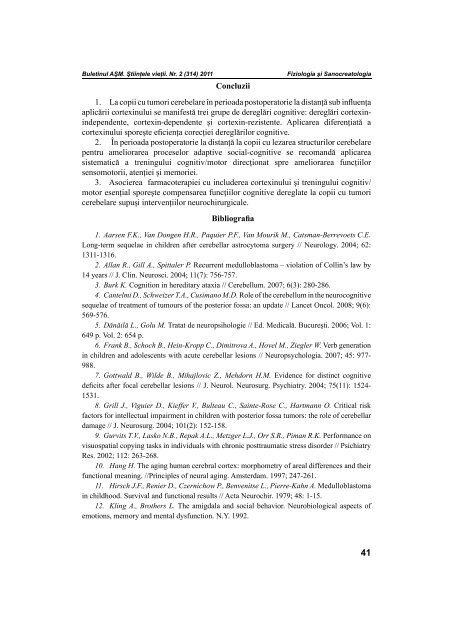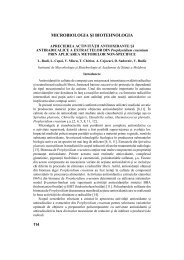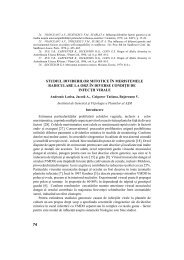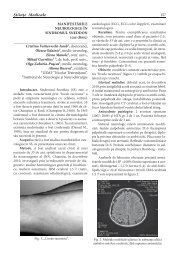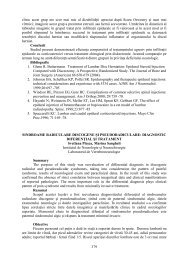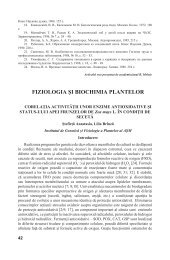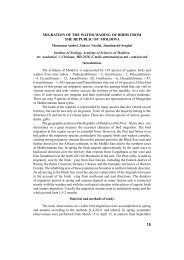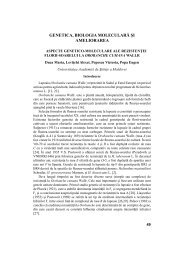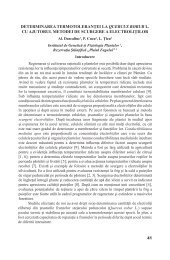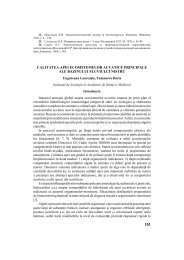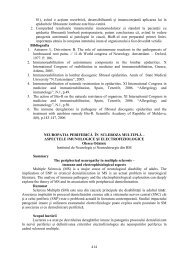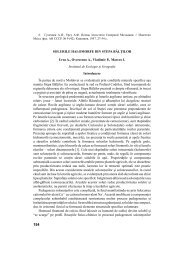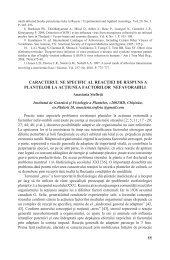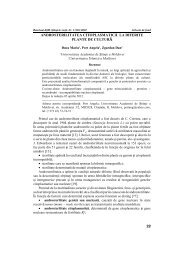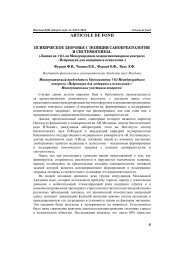209 CONTENTS
209 CONTENTS
209 CONTENTS
Create successful ePaper yourself
Turn your PDF publications into a flip-book with our unique Google optimized e-Paper software.
Buletinul AŞM. Ştiinţele vieţii. Nr. 2 (314) 2011<br />
Concluzii<br />
1. La copii cu tumori cerebelare în perioada postoperatorie la distanţă sub in uenţa<br />
aplicării cortexinului se manifestă trei grupe de dereglări cognitive: dereglări cortexinindependente,<br />
cortexin-dependente şi cortexin-rezistente. Aplicarea diferenţiată a<br />
cortexinului sporeşte e cienţa corecţiei dereglărilor cognitive.<br />
2. În perioada postoperatorie la distanţă la copii cu lezarea structurilor cerebelare<br />
pentru ameliorarea proceselor adaptive social-cognitive se recomandă aplicarea<br />
sistematică a treningului cognitiv/motor direcţionat spre ameliorarea funcţiilor<br />
sensomotorii, atenţiei şi memoriei.<br />
3. Asocierea farmacoterapiei cu includerea cortexinului şi treningului cognitiv/<br />
motor esenţial sporeşte compensarea funcţiilor cognitive dereglate la copii cu tumori<br />
cerebelare supuşi intervenţiilor neurochirurgicale.<br />
Bibliogra a<br />
Fiziologia şi Sanocreatologia<br />
1. Aarsen F.K., Van Dongen H.R., Paquier P.F., Van Mourik M., Catsman-Berrevoets C.E.<br />
Long-term sequelae in children after cerebellar astrocytoma surgery // Neurology. 2004; 62:<br />
1311-1316.<br />
2. Allan R., Gill A., Spittaler P. Recurrent medulloblastoma – violation of Collin’s law by<br />
14 years // J. Clin. Neurosci. 2004; 11(7): 756-757.<br />
3. Burk K. Cognition in hereditary ataxia // Cerebellum. 2007; 6(3): 280-286.<br />
4. Cantelmi D., Schweizer T.A., Cusimano M.D. Role of the cerebellum in the neurocognitive<br />
sequelae of treatment of tumours of the posterior fossa: an update // Lancet Oncol. 2008; 9(6):<br />
569-576.<br />
5. Dănăilă L., Golu M. Tratat de neuropsihologie // Ed. Medicală. Bucureşti. 2006; Vol. 1:<br />
649 p. Vol. 2: 654 p.<br />
6. Frank B., Schoch B., Hein-Kropp C., Dimitrova A., Hovel M., Ziegler W. Verb generation<br />
in children and adolescents with acute cerebellar lesions // Neuropsychologia. 2007; 45: 977-<br />
988.<br />
7. Gottwald B., Wilde B., Mihajlovic Z., Mehdorn H.M. Evidence for distinct cognitive<br />
de cits after focal cerebellar lesions // J. Neurol. Neurosurg. Psychiatry. 2004; 75(11): 1524-<br />
1531.<br />
8. Grill J., Viguier D., Kieffer V., Bulteau C., Sainte-Rose C., Hartmann O. Critical risk<br />
factors for intellectual impairment in children with posterior fossa tumors: the role of cerebellar<br />
damage // J. Neurosurg. 2004; 101(2): 152-158.<br />
9. Gurvits T.V., Lasko N.B., Repak A.L., Metzger L.J., Orr S.R., Piman R.K. Performance on<br />
visuospatial copying tasks in individuals with chronic posttraumatic stress disorder // Psichiatry<br />
Res. 2002; 112: 263-268.<br />
10. Hang H. The aging human cerebral cortex: morphometry of areal differences and their<br />
functional meaning. //Principles of neural aging. Amsterdam. 1997; 247-261.<br />
11. Hirsch J.F., Renier D., Czernichow P., Benvenitse L., Pierre-Kahn A. Medulloblastoma<br />
in childhood. Survival and functional results // Acta Neurochir. 1979; 48: 1-15.<br />
12. Kling A., Brothers L. The amigdala and social behavior. Neurobiological aspects of<br />
emotions, memory and mental dysfunction. N.Y. 1992.<br />
41


